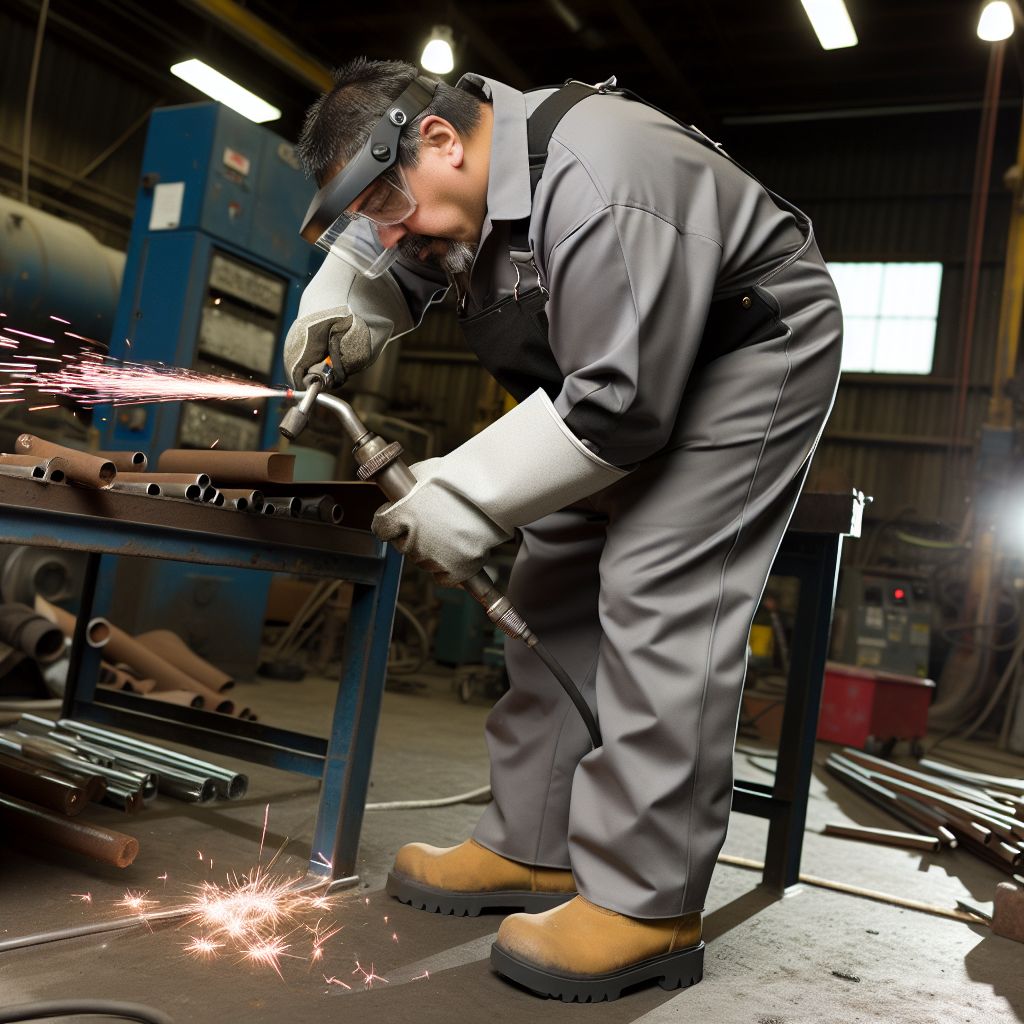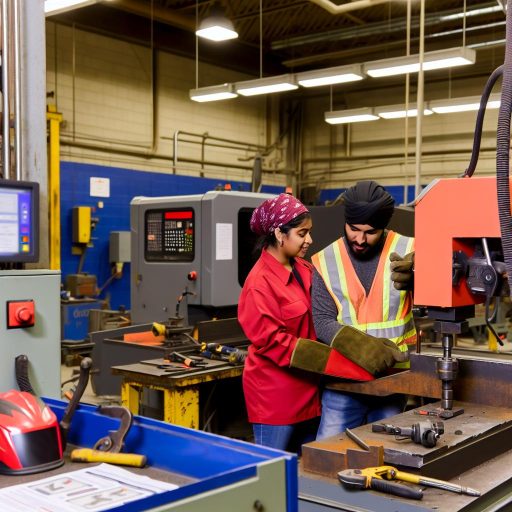Overview of the Metal Fabrication Industry in Canada
Current State of the Industry
The metal fabrication industry in Canada plays a vital role in the economy.
It encompasses the manufacturing of metal structures, components, and products.
This sector serves a variety of industries, including construction, automotive, and aerospace.
Moreover, the industry has shown consistent growth over recent years.
Technological advancements drive innovation and efficiency.
Key Players in the Market
Several well-known companies dominate the Canadian metal fabrication landscape.
Among them, Thompson Metal Works stands out for its quality products.
Likewise, Steel Solutions Inc. has established a strong reputation for reliability.
These businesses contribute to high demand for skilled metal fabricators.
Job Opportunities and Market Demand
The demand for metal fabricators remains robust across Canada.
With construction and manufacturing on the rise, job opportunities are plentiful.
Employers seek qualified candidates with relevant skills and training.
Furthermore, many companies offer apprenticeships to help trainees gain experience.
Challenges Facing the Industry
Despite its strengths, the metal fabrication industry faces challenges.
Skills shortages present a significant hurdle for employers.
Additionally, fluctuating materials costs affect pricing and profit margins.
Lastly, competition from global markets continues to grow.
Educational Requirements for Metal Fabricators in Canada
High School Diploma
A high school diploma is essential for aspiring metal fabricators.
This foundational education provides basic math and science skills.
Additionally, it introduces students to various technical subjects.
Courses in shop and industrial arts are particularly beneficial.
Post-Secondary Education
Many employers prefer candidates with post-secondary education.
Trade schools offer programs specifically for metal fabrication.
These programs often include hands-on training and theory.
Graduates gain skills in welding, machining, and blueprint reading.
Unlock Your Career Potential
Visualize a clear path to success with our tailored Career Consulting service. Personalized insights in just 1-3 days.
Get StartedApprenticeship Programs
Apprenticeships combine classroom education with on-the-job training.
They typically last three to five years in Canada.
Apprentices learn under the guidance of experienced fabricators.
Completion of an apprenticeship leads to certification as a journeyperson.
Certification and Licensing
Although not mandatory, certification enhances job prospects.
The Canadian Welding Bureau (CWB) offers certification programs.
These programs validate skills and knowledge in welding and fabrication.
Obtaining certification can lead to higher wages and better positions.
Continuous Learning
The field of metal fabrication is constantly evolving.
Staying updated with technology and techniques is crucial.
Workshops and industry conferences are excellent for professional development.
Many fabricators pursue additional courses to enhance their skills.
Essential Skills and Competencies for Metal Fabricators
Technical Skills
Metal fabricators must possess strong technical skills.
They should understand blueprints and technical drawings.
Measurements and calculations are critical for precise work.
Furthermore, proficiency in using hand tools is essential.
Welding is a vital skill for fabricators to possess.
Experience with various welding techniques enhances versatility.
Additionally, knowledge of metal properties is beneficial.
Problem-Solving Skills
Effective problem-solving skills are crucial in metal fabrication.
Fabricators often encounter unexpected challenges during projects.
They need to think critically and creatively to resolve issues.
Moreover, quick decision-making can save time and resources.
Attention to detail helps in identifying potential problems early.
Physical Stamina and Strength
The job of a metal fabricator requires physical stamina.
Fabricators often lift heavy materials and equipment.
They need to maintain endurance during long shifts.
Additionally, hand-eye coordination plays a significant role.
This skill aids in performing delicate tasks accurately.
Collaboration and Communication Skills
Metal fabricators must work well with a team.
Strong communication skills facilitate effective collaboration.
They should clearly express ideas and instructions to colleagues.
Active listening is equally important in understanding team needs.
Furthermore, a positive attitude fosters a supportive work environment.
Attention to Safety
Safety is paramount in metal fabrication work.
Fabricators must adhere strictly to safety protocols.
Wearing protective gear is essential to prevent injuries.
Regular safety training helps maintain a safe workspace.
Being aware of surroundings reduces the risk of accidents.
Find Out More: Skills Every Aspiring Metal Fabricator Should Master
Certifications and Licenses Needed for Metal Fabricators
Certifications enhance a metal fabricator’s skill set and marketability.
They validate expertise and knowledge in the field.
Furthermore, certifications demonstrate a commitment to quality.
Common Certifications
Many employers seek candidates with specific certifications.
Effective, practical certifications include:
- Certified Welder by the American Welding Society (AWS).
- Canadian Welding Bureau (CWB) certification.
- Forklift operator certification.
- First aid and CPR training.
Additional Training Programs
Beyond certifications, ongoing training proves valuable.
Many training programs are available in various formats, including:
- Workshops.
- Online courses.
- Apprenticeships with skilled professionals.
These programs often align with industry standards.
They ensure metal fabricators remain competitive in the workforce.
Licensing Requirements
In some provinces, specific licenses may be necessary.
Licensing varies based on region and job type.
For instance, operating certain machinery may require a license.
Workers should research local regulations to ensure compliance.
Benefits of Obtaining Certifications and Licenses
Certifications and licenses open up various job opportunities.
They often lead to higher salaries and promotions.
Moreover, they provide a sense of professional achievement.
Employers frequently prefer candidates with recognized credentials.
Learn More: Insights into Construction Laws for Bricklayers
Work Experience and Apprenticeships in Metal Fabrication
Importance of Hands-On Experience
Hands-on experience plays a crucial role in metal fabrication.
It helps trainees develop practical skills and workplace competency.
Furthermore, experience enhances problem-solving abilities significantly.
Types of Work Experience
Many aspiring metal fabricators benefit from internships.
Companies like Maple Leaf Metals offer internship programs.
These programs provide valuable exposure to real-world projects.
Additionally, summer jobs in fabrication shops are advantageous.
Apprenticeship Programs
Apprenticeships serve as a critical stepping stone into the field.
These programs typically last four years and combine classroom learning with on-the-job training.
For example, students may train at local community colleges like George Brown College.
Successful apprentices receive a certification upon completion.
Finding Apprenticeship Opportunities
Prospective apprentices can search for opportunities online.
Industry websites and trade associations often list available positions.
Networking within the fabrication community also yields potential leads.
Furthermore, attending industry conferences can provide valuable connections.
Skills Developed During Apprenticeships
Apprenticeships cultivate various skills essential for metal fabrication.
Fabrication techniques, welding methods, and blueprint reading are core competencies.
Moreover, apprentices learn to operate tools and machinery safely.
These experiences significantly boost employability after completion.
You Might Also Like: Exploring the Day-to-Day Tasks of an Ironworker

Health and Safety Standards in Metal Fabrication
Understanding Safety Regulations
Metal fabrication involves inherent risks and hazards.
Complying with safety regulations is crucial for protecting workers.
Organizations such as the Canadian Centre for Occupational Health and Safety (CCOHS) set these standards.
These regulations provide guidelines for safe practices and environment.
Personal Protective Equipment (PPE)
Wearing appropriate PPE is mandatory in metal fabrication.
Common PPE includes gloves, helmets, and protective eyewear.
These items safeguard workers from injuries caused by sharp materials and machinery.
Employers must ensure that all employees have access to necessary PPE.
Equipment Safety Procedures
Equipment used in metal fabrication often poses significant dangers.
Operators must receive training on how to use machinery safely.
Regular maintenance checks are essential to prevent malfunctions.
Failing to follow protocol can lead to serious accidents.
Emergency Preparedness
Every fabrication shop should have an emergency plan in place.
The plan must outline evacuation routes and procedures.
All employees should be aware of the plan and participate in regular drills.
Additionally, first-aid kits should be easily accessible.
Workplace Hygiene and Ergonomics
Maintaining proper hygiene is vital in metal fabrication shops.
Clean workspaces reduce the risk of accidents and injuries.
Employers should also promote ergonomic practices.
These practices minimize strain and injuries related to repetitive tasks.
Explore Further: Key Tools Used by Professional Metal Fabricators
Job Prospects and Employment Opportunities for Metal Fabricators
Current Job Market Overview
The demand for metal fabricators continues to grow in Canada.
This growth stems from multiple industries requiring skilled labor.
Manufacturing, construction, and aerospace are leading sectors in this field.
Corporations increasingly seek qualified professionals to meet project demands.
Job prospects remain favorable, particularly in urban centers.
Skills and Qualifications Required
Employers value hands-on experience and technical skills.
Metal fabricators should be proficient in welding techniques.
Knowledge of reading blueprints is equally essential.
Familiarity with various metal types enhances employability.
Additionally, safety training plays a crucial role in job readiness.
Potential Employers and Industries
Metal fabricators can find opportunities in diverse industries.
Manufacturing companies often require custom fabrication services.
Construction companies need metalworkers for structural components.
Aerospace and automotive sectors also seek specialized skills.
Moreover, smaller shops offer apprenticeship programs for beginners.
Regional Opportunities
Job availability varies by region across Canada.
Ontario and Alberta typically have the highest demand.
Quebec also presents significant opportunities in manufacturing.
In British Columbia, construction projects frequently require metal fabricators.
On the other hand, rural areas may offer fewer job openings.
Growth Potential and Career Advancement
Starting as a junior metal fabricator can lead to significant career growth.
With experience, professionals can advance to supervisory roles.
Some may even start their own fabrication businesses.
Additionally, specialization in areas like welding can boost earnings.
Continuous education and certification are beneficial for upward mobility.
Common Tools and Equipment Used by Metal Fabricators
Essential Hand Tools
Metal fabricators rely on various hand tools for detailed work.
Wrenches are vital for tightening and loosening bolts and nuts.
Screwdrivers help in assembling components securely.
Pliers, especially needle-nose types, allow for precision handling.
Additionally, hammers play a crucial role in shaping metal pieces.
Power Tools
Power tools significantly enhance the efficiency of metal fabrication.
Drills are commonly used for creating holes in metal pieces.
Angle grinders assist in cutting and polishing surfaces effectively.
Plasma cutters provide precision cuts for intricate designs.
Moreover, welders join metal parts through various welding techniques.
Cutting Equipment
Cutting equipment is essential in the initial stages of metal fabrication.
Band saws offer smooth and accurate cuts for larger sheets.
Table saws are used for precise cutting of smaller components.
Laser cutters excel at creating intricate designs with minimal waste.
Measuring and Layout Tools
Accurate measurements ensure quality outcomes in fabrication work.
Tape measures are standard tools for obtaining dimensions.
Calipers provide precision measurements for detailed components.
Square tools help in maintaining right angles during assembly.
Safety Equipment
Safety equipment is crucial for protecting fabricators during work.
Gloves safeguard hands from sharp metal edges.
Goggles protect eyes from sparks and debris during cutting or welding.
Respirators filter harmful dust and fumes while working.
Hearing protection is essential when using loud power tools.
Additional Resources
Metal Fabricator (Fitter) – Skilled Trades Ontario
I am Nigerian, a skilled welder and metal fabricator. I want to …




